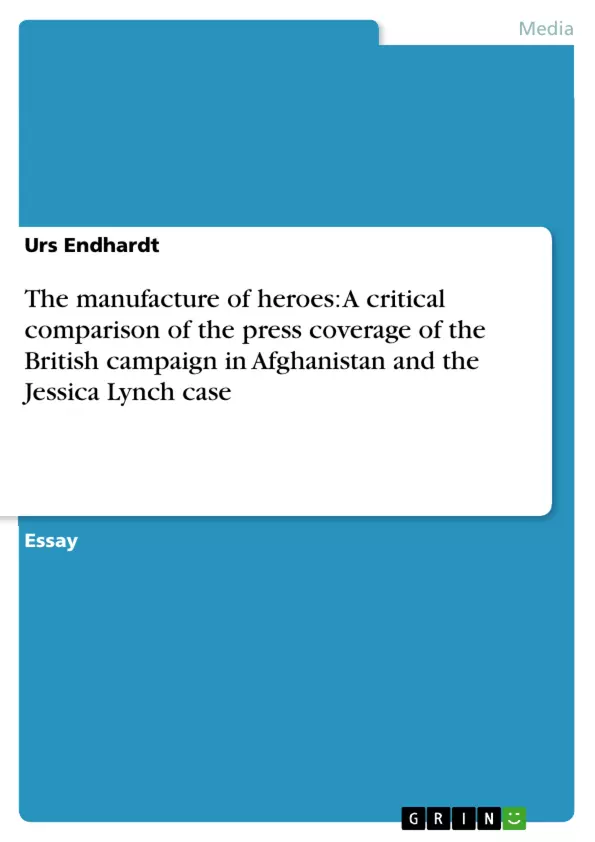Hero/Heroine: „A man/woman, who is admired for their courage, outstanding achievements, or noble qualities: a war hero, she was a true feminist heroine” (Oxford 2010). The need for a hero or a heroine is probably as old as humanity itself. Whether it was the mythical Achilles in Greek mythology, Admiral Nelson in British history or Margaret Corbin, a heroine of the American Revolutionary War, in the American one, people always felt the urge to have somebody to look up at.
By the example of two modern heroic legends, Jessica Lynch and the average British soldier in Afghanistan, I want to find out why this need for heroes exists, where it comes from, and how the media deals with it. Additionally, I will try to find out whether the manufacture of heroes serves the interests of the media and the government, and if it does, what interests this could be and how they are pursued
Inhaltsverzeichnis (Table of Contents)
- Introduction
- The US Media
- Objection, hearsay! Initial Media Reports of Jessica Lynch's Abduction
- "She did not want to be taken alive." How the US Media Covered the Legend of Lynch
- The British Media
- Counting the Dead. The New Standard of Reporting?
- "Backing Our Boys." How the British Media Covers the Fate of British Soldiers in Afghanistan
- Conclusion
Zielsetzung und Themenschwerpunkte (Objectives and Key Themes)
This paper critically examines the media portrayal of two modern heroic legends, Jessica Lynch and the average British soldier in Afghanistan. It aims to explore the reasons behind the need for heroes, the media's role in constructing heroic narratives, and the potential influence of these narratives on public perception and government agendas. The key themes explored in this paper are:- The Media's Role in Manufacturing Heroes
- The Influence of Captivity Narratives on Public Perception
- The Impact of Media Coverage on Political Decisions
- The Use of Gender Stereotypes in Heroic Narratives
- The Contrast in Media Portrayals of the US and British Military
Zusammenfassung der Kapitel (Chapter Summaries)
- Introduction: This section provides a definition of the term "hero/heroine" and introduces the two case studies: Jessica Lynch and the average British soldier in Afghanistan. The author outlines the paper's objectives to analyze the media's role in manufacturing heroes and the potential impact of these narratives on public opinion and government interests.
- The US Media: This section focuses on the media coverage of Jessica Lynch, starting with the initial reports of her abduction and rescue. The author analyzes the conflicting narratives surrounding Lynch's experiences, highlighting the media's tendency to portray her as both a fragile victim and a strong heroine. This chapter explores the use of gender stereotypes, the fascination with captivity narratives in American culture, and the potential influence of media coverage on political decisions, such as the awarding of a military medal.
- The British Media: This section examines the media coverage of the British campaign in Afghanistan, particularly the reporting of casualties and the portrayal of British soldiers. The author explores how the British media constructs narratives of sacrifice and national unity, drawing comparisons between the US and British media's approaches to reporting on war and heroism.
Schlüsselwörter (Keywords)
This paper explores the themes of media representation, heroism, captivity narratives, gender stereotypes, war propaganda, and public perception. It examines the role of the media in shaping public understanding of war and the potential influence of these narratives on political decisions. Key concepts include the Jessica Lynch case, the British campaign in Afghanistan, media bias, and the construction of national identity.Frequently Asked Questions
What is the "manufacture of heroes" in media?
It refers to the process by which media and governments construct heroic narratives to serve specific interests, influence public perception, or build national identity during wartime.
How did the US media portray Jessica Lynch?
The media coverage was conflicting, often portraying her simultaneously as a fragile victim and a strong heroine, utilizing gender stereotypes and fascination with captivity narratives.
What characterizes the British media's coverage of the Afghanistan campaign?
The British media often focuses on narratives of sacrifice and national unity ("Backing Our Boys"), with a specific standard for reporting casualties and soldier fate.
Why do societies have a psychological need for heroes?
The need for figures to look up to is as old as humanity, providing moral guidance and a sense of shared courage, from mythical Achilles to modern soldiers.
How do heroic narratives influence political decisions?
Media-driven heroism can pressure governments into specific actions, such as awarding military medals or maintaining public support for controversial military campaigns.
- Citation du texte
- MA Urs Endhardt (Auteur), 2011, The manufacture of heroes: A critical comparison of the press coverage of the British campaign in Afghanistan and the Jessica Lynch case, Munich, GRIN Verlag, https://www.grin.com/document/179460



